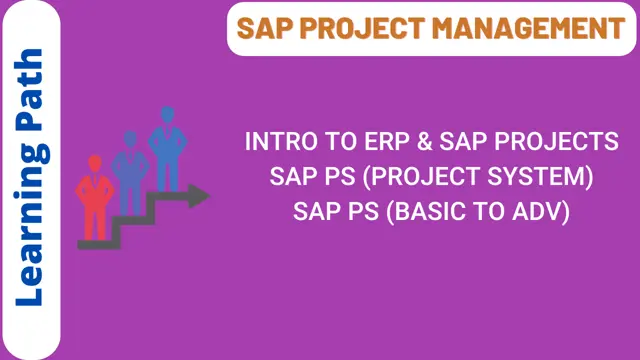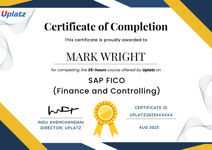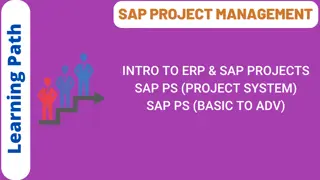
Learning Path - SAP Project Management
Program with full courses on all SAP Project Management related modules. Study Material. Course Completion Certificate.
Uplatz
Summary
- Uplatz Certificate of Completion - Free
Add to basket or enquire
Overview
Uplatz provides this comprehensive Learning Path program on SAP Project Management. It is a program covering all SAP modules related to SAP Project Management domain in the form of self-paced video tutorials. You will be awarded Course Completion Certificate at the end of the course.
Learning Path - SAP Project Management consists of the following courses:
1. Introduction to ERP & SAP and SAP Projects
2. SAP PS (Project System)
3. SAP PS (basic to advanced)
SAP Project Management and SAP Project System (PS) are both modules within the SAP ERP system that are designed to help organizations manage their projects. However, there are some key differences between the two modules.
SAP Project Management is a top-level module that provides a high-level overview of projects, including their status, costs, and risks. It is a good choice for organizations that want to manage a small number of projects or that do not need the full functionality of SAP PS.
SAP Project System is a more comprehensive module that provides a wide range of features for managing projects, including:
- Work Breakdown Structure (WBS): A hierarchical structure that breaks down a project into smaller, manageable tasks.
- Network Planning: A tool for scheduling and coordinating the tasks in a project.
- Costing: A system for tracking and analyzing project costs.
- Earned Value Management (EVM): A method for measuring project progress and performance.
SAP Project System is a good choice for organizations that manage a large number of projects or that need the full functionality of a project management system.
Key benefits of using SAP Project Management or SAP Project System:
- Improved project planning and execution: SAP Project Management and SAP Project System can help you plan your projects more effectively and execute them more efficiently. This can lead to reduced costs and improved project outcomes.
- Increased visibility into project status: SAP Project Management and SAP Project System can provide you with real-time visibility into the status of your projects. This can help you identify and address potential problems early on, which can help you avoid delays and cost overruns.
- Improved decision-making: SAP Project Management and SAP Project System can provide you with the data you need to make informed decisions about your projects. This can help you make better choices about resource allocation, scheduling, and budgeting.
SAP Project Management and SAP Project System can be valuable tools for organizations that need to manage their projects effectively. The best module for your organization will depend on your specific needs and requirements.
Course media
Description
Overview: SAP Project Management is a module within the SAP ERP (Enterprise Resource Planning) system that focuses on managing projects efficiently and effectively. It provides tools and functionalities to plan, execute, and monitor projects throughout their lifecycle. The module is designed to help organizations streamline project management processes, improve collaboration, and achieve successful project outcomes.
Key Features
Project Planning and Organization
- Enables users to define project objectives, scope, and structures.
- Supports project planning activities, including scheduling, resource allocation, and budgeting.
Team Collaboration
- Facilitates collaboration among project team members by providing a centralized platform for communication and information sharing.
Project Execution and Monitoring
- Assists in executing project tasks and monitoring progress in real-time.
- Provides tools for tracking project milestones, timelines, and costs.
Resource Management
- Helps in efficiently managing and allocating resources, including personnel, equipment, and materials, to meet project requirements.
Integration with Other SAP Modules
- Integrates seamlessly with other SAP modules such as Finance (FI), Controlling (CO), Material Management (MM), and Human Capital Management (HCM) for a holistic view of project impact.
Document Management
- Supports the management and organization of project-related documents, facilitating easy access and retrieval.
Project Monitoring and Reporting
- Offers reporting and analytics tools for monitoring key performance indicators (KPIs) and generating project-related reports.
Risk Management
- Provides features for identifying, analyzing, and mitigating risks associated with project activities.
Training and Support
- Includes features for training end-users and providing ongoing support to ensure effective use of the module.
Overview: SAP Project System (PS) is a specialized module within the SAP ERP system that focuses on supporting project-related processes. It is designed to meet the specific needs of organizations involved in projects, such as construction, engineering, and manufacturing. SAP PS helps in structuring, planning, and controlling projects by providing comprehensive tools for project management.
Key Features
Project Structuring
- Allows the creation and structuring of projects using Work Breakdown Structures (WBS) to organize project tasks hierarchically.
Project Planning
- Provides tools for detailed project planning, including scheduling, resource planning, and budgeting.
Resource Management
- Facilitates the efficient allocation and management of resources, including personnel, equipment, and materials.
Cost Management
- Supports cost planning, budgeting, and tracking of project expenditures.
Integration with other SAP Modules
- Integrates with various SAP modules to ensure consistency and data accuracy across the organization.
Project Monitoring and Reporting
- Enables real-time monitoring of project progress and the generation of reports to analyze project status and performance.
Document Management
- Supports the management of project-related documents and files within the SAP PS module.
Collaboration and Communication
- Facilitates collaboration and communication among project stakeholders and team members.
Project Execution and Control
- Supports the execution of project activities and provides control mechanisms to ensure adherence to the project plan.
Industry-Specific Functionality
- Offers industry-specific functionalities to cater to the diverse needs of different sectors involved in projects.
Both SAP Project Management and SAP Project System modules play critical roles in helping organizations effectively plan, execute, and monitor projects, contributing to overall operational success. The choice between the two modules often depends on the specific needs and industry focus of the organization.
The career path in SAP Project Management or SAP Project System can be very rewarding, with opportunities for advancement and high earning potential. Here are some of the career paths you can take in these modules:
Project Manager
- Entry-level position: Project coordinator, assistant PM
- Mid-level position: Project manager, senior PM
- Senior-level position: Program manager, senior program manager
- Management level: Director of project management, SVP of project management
Functional Analyst
- Entry-level position: Technical consultant, SAP consultant
- Mid-level position: Senior technical consultant, senior SAP consultant
- Senior-level position: Principal technical consultant, principal SAP consultant
- Management level: Head of SAP project management, director of SAP project management
Solutions Architect
- Entry-level position: Solutions engineer, SAP consultant
- Mid-level position: Senior solutions engineer, senior SAP consultant
- Senior-level position: Principal solutions architect, principal SAP architect
- Management level: Head of SAP solutions architecture, director of SAP solutions architecture
Project Engineer
- Entry-level position: Project engineer, SAP technician
- Mid-level position: Senior project engineer, senior SAP technician
- Senior-level position: Principle project engineer, principle SAP technician
- Management level: Head of SAP project engineering, director of SAP project engineering
SAP Consultant
- Entry-level position: SAP consultant, junior consultant
- Mid-level position: Senior SAP consultant, SAP project manager
- Senior-level position: Principal SAP consultant, senior project manager
- Management level: Head of SAP consulting, director of SAP consulting
Independent Consultant
- Entry-level position: Independent consultant, freelancer
- Mid-level position: Experienced consultant, experienced freelancer
- Senior-level position: Senior consultant, senior freelancer
- Management level: Head of consulting firm, owner of consulting firm
These are just a few of the many career paths that are available in SAP Project Management and SAP Project System. With the right education and experience, you can achieve your career goals in these exciting fields.
Who is this course for?
Everyone
Requirements
Passion and enthusiasm to achieve your goals!
Career path
- SAP Project Manager
- SAP Functional Consultant
- Program Manager
- Functional Analyst
- Solution Architect
- SAP Manager
- SAP Implementation Analyst
- SAP Consultant
- SAP Support Analyst
- Product Manager
- Project Manager
- Chief Operating Office (COO)
- SAP Project Engineer
Questions and answers
Currently there are no Q&As for this course. Be the first to ask a question.
Certificates
Uplatz Certificate of Completion
Digital certificate - Included
Course Completion Certificate by Uplatz
Reviews
Currently there are no reviews for this course. Be the first to leave a review.
Legal information
This course is advertised on reed.co.uk by the Course Provider, whose terms and conditions apply. Purchases are made directly from the Course Provider, and as such, content and materials are supplied by the Course Provider directly. Reed is acting as agent and not reseller in relation to this course. Reed's only responsibility is to facilitate your payment for the course. It is your responsibility to review and agree to the Course Provider's terms and conditions and satisfy yourself as to the suitability of the course you intend to purchase. Reed will not have any responsibility for the content of the course and/or associated materials.



